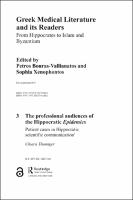Chapter 3 The professional audiences of the Hippocratic Epidemics
Proposal review
Patient cases in Hippocratic scientific communication
Author(s)
Thumiger, Chiara
Collection
WellcomeLanguage
EnglishAbstract
To summarise our findings, the Hippocratic Epidemics case reports is an example of a text whose intended audiences, despite the ambiguities and historical
uncertainties about the texts’ composition and transmission, were very firmly
delimited as professional and medical. Such closure defines this phase of ancient
medicine as particularly territorial and “technical”, on the one hand – no literary
pretence, nor broader intellectual appeal of the kind shown by Galen is on the
horizon of these writers, nor any explicit attempt to win over lay audiences, at
least in the Epidemics.77 Also, it tells us something about the epistemology and
didactics at work in the Hippocratic handling of patients, which we can summarise
as follows: non-theoretical, observation-based and data-centred; self-standing,
i.e. not relying on a system of knowledge or a “syllabus” (compare Galen’s
frequent recommendation on which of his books one should read first, which are
for beginners, what should follow, etc.), but needing to “support itself” by insuring
the memorisation of the repertoires of observations, procedures, risks and
mistakes; lack of a synthesis of the empirical data, such as a form of diagnosis,
or of the “epistemological extension” that might turn the observed case into an
“experiment”.78 The Hippocratic use of individual evidence – the patient case –
remained in this early stage a communication of pure data. Individual memory,
in conclusion, the reception of an individual intellect – a future student, a training
doctor – characterises the audience of these texts, motivates and even determines,
concretely, their very existence.
Keywords
patient cases; hippocratic; communication; patient cases; hippocratic; communication; Case report; Epidemic; Epistemology; Galen; History of medicine; Medicine; Mnemonic; PhysicianISBN
9781351205276OCN
1030819462Publisher
Taylor & FrancisPublisher website
https://taylorandfrancis.com/Publication date and place
2018Grantor
Imprint
RoutledgeClassification
Medicine and Nursing


 Download
Download